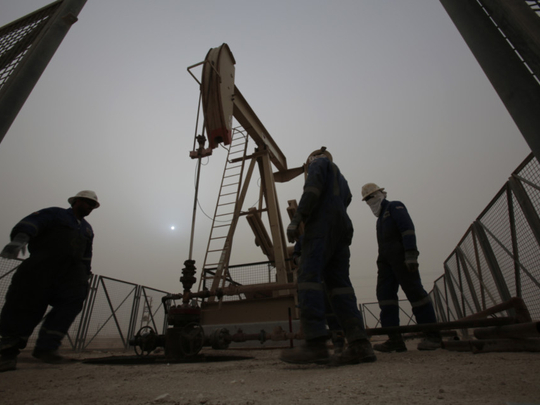
While a certain, nervous tension governs investors awaiting the next bout of volatility in financial markets, right now another quieter interlude has eased into place.
Greece may well be the next port of call for those primed for panic, but for the moment the muddling-through motif continues to prevail, and stock markets in the region have been cheered a touch by the recovery of oil prices.
There’s an opportunity this week therefore to reflect on the Gulf economy itself again.
Here, the implied improvement to government treasury coffers may calm concerns, although Opec has apparently conceded that the pinch will be felt for many years ahead, seeing a return to the $100 (Dh367) barrel as unlikely.
Following last week’s look at the separation of cyclical and structural issues for the economy, another point worth considering is the theme that periodically informs talk of the Gulf’s prospects, namely regional cooperation.
Mostly that concept has tended to make headlines in reference to customs or monetary union, or projects such as the planned rail network, or indeed greater concerns of territorial security.
These are either institutional matters grounded in political forces and relations, which will take their course as a matter of history, or familiar areas of economic rumination.
Getting back to basics again on the Gulf economy, though, a study published this month by the King Abdullah Petroleum Studies and Research Centre (KAPSARC) has dug into fundamental implications for the GCC states as energy-dominated economies, calling for combined measures (see box).
“Initiatives that propose a shared energy infrastructure [regional gas and electricity grids] may not have been able to assess the costs and benefits at the level of the aggregate economy of the region,” the report advises, identifying the sporadic nature of research investigations hitherto.
A key point made is that the Gulf is unique in ways that have to be accounted for when modelling policy outcomes, particularly in making adjustments to subsidised energy prices that underpin usage.
“One such attribute is the demographic structure. Around half of the region’s population is of expatriates, whose migration is correlated with economic activity,” says the paper. Issues arise for economic planning from the differentiation of local and foreign household types, and the impact of remittance flows, draining resources at six times or more the rate of the US. Such features and dynamics have yet to be comprehensively tested, it seems.
On electricity prices, “often below the cost of generation and distribution … there is little empirical evidence from which to assess how households might react to significant price changes”, KAPSARC observes.
Fiscal policy
Another matter to address is the computation of structural change, inasmuch as that macroeconomic models can conventionally only address short-term trends, particularly in the Gulf in relation to fiscal policy.
In an observation affirming the difference between purely cyclical events and, instead, the long term, as made here last week, KAPSARC’s work notes that “purely econometric models are, by their nature, estimated using historical information. They also do not possess a fine representation of technology in industrial production.” By comparison, “optimisation techniques model the decisions made by economic actors in response to a policy change”.
One critical finding from such a holistic approach is that “analyses suggest that [Gulf] industry can significantly reduce its energy consumption without significantly harming competitiveness”.
The work’s appeal, again, is for greater coordination, producing assessments for “exploring policies that simultaneously maintain social objectives and increase efficiency”.
At region level, seemingly there remains plenty yet to do to harmonise these efforts, for example in pursuing an integrated power transmission system.
“There are several layers of foundational collaboration required before there is a likelihood of shared infrastructure in the GCC proving successful,” the research suggests, including common definitions and transparent sharing of data, consistent and ideally integrated models of the energy economies, and better harmonised regulatory regimes.
If the region accepts Opec’s financial prognosis — and indeed the Saudi oil minister’s stated view of a severe reduction to fossil-fuel dependence by 2050 — then clearly much work remains outstanding to advance the collective economic interests of a region with so much vitally in common.












